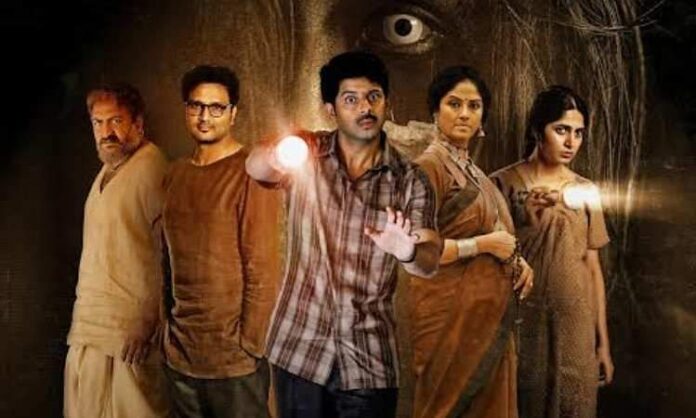Film titles are a good reminder of the turncoat nature of language. In the 2023 Malayalam film, Purusha Pretham, pretham, shorthand in Sanskrit for ghost, is also the word for corpses. Yet, the ghostly semantics also fit in this absurd procedural drama about unclaimed dead bodies. The film is filled with an ongoing sense of foreboding. Similarly, Pindam, which usually refers to saintly offerings passed to one’s deceased ancestors in Hindu cultures, also doubles up as a word for a foetus. Pindam is also interested in the realm between life and death on a philosophical level. Is death the end we think it is? Is birth the beginning we believe it to be? Ghosts, obviously, exist between the dead and the living, and what is pindam if not a conduit of obeisance from the living to the dead? The allegory makes another iteration, with an old woman in the film believing that a foetus could be a reincarnation of her long-dead husband. So, is the foetus in question, a symbol of the living or the dead? Is it a representation of the new, the old, or both? Existing in the Venn diagram of the new and the old and the living and the dead is tradition. Hovering around like a ghost, refusing to budge, time be damned.
Director – Sai Kiran Daida
Cast – Srikanth Sriram, Easwari Rao, Kushee Ravi, Srinivas Avasarala, Baby Chaitra, Baby Leisha
Pindam has a simple, straightforward plot. A family — father, mother, grandmother, two little kids — enters a new home in a fictional town in the early 90s (Suklapet). Beyond the lull of domesticity lie skeletons all too familiar. The two children are girls. The mother is pregnant. The grandmother cannot help but badger the family for a boy. The second child is hearing and speech impaired, unable to attend school on grounds of her disability. The father loses his job (he is an accountant at a rice mill) due to a white-collar crime. He has also, unfortunately, made a bad investment every other father in a horror film makes with comical regularity — spending all his savings on a house he later finds to be haunted. The couple also ponders an abortion at some point, in light of their fast incoming penury. This would have been an easier pill to swallow if the woman was not in her second trimester. The fact that the family is Christian — the devout kind that has two dozen pictures of Christ plastered across the house — also makes their abortion idea sound darker than what it already is. The girls are also resentful of the third kid’s arrival. Despite being very young, they know their status quo will shake up with another child in the picture. Especially if it is a boy. There is something extremely biting about the oldest kid in the family shouting, “Do we really need another child in the house?” The honesty of this detail makes up for the spoon-feeding involved with the second kid’s scenes, which had a voiceover drown over the sign language. Again, something about a mute kid getting her lines dubbed to be heard in the background, lines which she cannot speak or hear herself as a character, made for some unintentional dark comedy.
The real-time horror shaped by the family’s dysfunction meets conventional horror, jump scares, and what-not. The kids are alright, at least the alive ones. We go through scene after scene of things going wrong in the household. The pacing of the film is slow enough to push us into the realm of the dead. Almost. Enter Demonologist Annamma (Easwari Rao). Bearing witness to time, we see her in the 90s and the present day, where she is narrating the horrors of Suklapet to a curious researcher (Srinivas Avasarala). Rosary-clutching Annamma is a Hindu by birth. We never know why she converted but she mentions heading overseas in her youth to learn exorcism, a more canonically Christian practice. Stretching beyond the Hindu-Christian binary, Annamma’s home has symbols of all religions scattered on her wall. Even when she performs an exorcism, we see one of her minions read a book with verses of different tongues, presumably from the Bible, Quran and The Torah. What is this single, oh-so-secular book that has managed to collate verses from all major faiths? The multi-faith exorcism culminates in a very Hindu ceremony, which makes one wonder if the showmanship of inter-religious harmony is a rather backhanded way of elevating the tolerant, pluralist ethos of Hinduism? Even Masooda, a film centered on the plight of a tormented Muslim mother and daughter (and their abusive, absentee Muslim dad), sets the entire stage for a Hindu man named Gopi to save the day. There is something extremely earnest (or smartly sneaky) about a narrative circumambulating around secularism to display the Hindu faith as the saviour. Especially at a time when secularism is increasingly seen as the enemy of Hinduism. Pindam shines with its themes. Its treatment, however, is left far behind. For a film brimming with such new-age horror potential, why did it opt for a rather Blumhouse-level conventional horror treatment? The ideas are as delicate as a foetus, the execution remains as obsolete as a ghost.
#Pindam #Movie #ReviewJump #scares #bump #scares #Cinema #express

